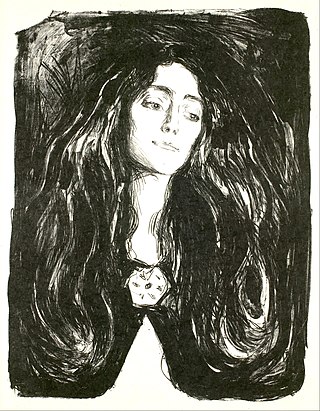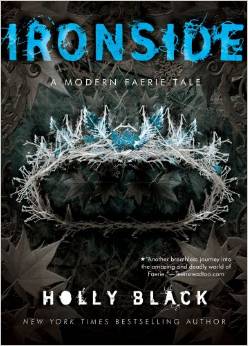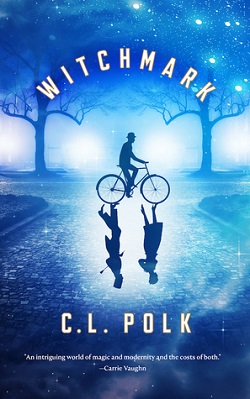
Borderline personality disorder (BPD) is a personality disorder characterized by a pervasive, long-term pattern of significant interpersonal relationship instability, a distorted sense of self, and intense emotional responses. People diagnosed with BPD frequently exhibit self-harming behaviours and engage in risky activities, primarily due to challenges regulating emotional states to a healthy, stable baseline. Symptoms such as dissociation, a pervasive sense of emptiness, and an acute fear of abandonment are prevalent among those affected.
A love–hate relationship is an interpersonal relationship involving simultaneous or alternating emotions of love and hate—something particularly common when emotions are intense. The term is used frequently in psychology, popular writing and journalism. It can be applied to relationships with inanimate objects, or even concepts, as well as those of a romantic nature or between siblings and parents/children.

Psychological pain, mental pain, or emotional pain is an unpleasant feeling of a psychological, non-physical origin. A pioneer in the field of suicidology, Edwin S. Shneidman, described it as "how much you hurt as a human being. It is mental suffering; mental torment." There are numerous ways psychological pain is referred to, using a different word usually reflects an emphasis on a particular aspect of mind life. Technical terms include algopsychalia and psychalgia, but it may also be called mental pain, emotional pain, psychic pain, social pain, spiritual or soul pain, or suffering. While these clearly are not equivalent terms, one systematic comparison of theories and models of psychological pain, psychic pain, emotional pain, and suffering concluded that each describe the same profoundly unpleasant feeling. Psychological pain is widely believed to be an inescapable aspect of human existence.

War for the Oaks (1987) is a fantasy novel by American writer Emma Bull. The book tells the story of Eddi McCandry, a rock musician who finds herself unwillingly pulled into the supernatural faerie conflict between good and evil. War for the Oaks is one of the first works in the subgenre of urban fantasy: although it involves supernatural characters, the setting (Minneapolis) is decidedly real-world. The novel is considered one of the first examples of the subgenre known as romantasy.

Ironside: A Modern Faerie Tale is a young adult urban fantasy novel by Holly Black. It was published in 2007 by the Margaret K. McElderry imprint of Simon & Schuster and is recommended for readers aged "14 and above".

Tithe: A Modern Faerie Tale is a young-adult fantasy novel written by Holly Black. It was published in 2002 by Simon & Schuster, who recommended it for "ages 12 up". Sequels – Valiant (2005) and Ironside (2007) – completed a trilogy that is sometimes called [A] Modern Tale of Faerie, the subtitle of volume two.
Borderline or Border Line may refer to:

A Caress of Twilight is the second novel in the Merry Gentry series by American writer Laurell K. Hamilton.
Marsha M. Linehan is an American psychologist and author. She is the creator of dialectical behavior therapy (DBT), a type of psychotherapy that combines cognitive restructuring with acceptance, mindfulness, and shaping.
Splitting, also called binary thinking, dichotomous thinking, black-and-white thinking, all-or-nothing thinking, or thinking in extremes, is the failure in a person's thinking to bring together the dichotomy of both perceived positive and negative qualities of something into a cohesive, realistic whole. It is a common defense mechanism, wherein the individual tends to think in extremes. This kind of dichotomous interpretation is contrasted by an acknowledgement of certain nuances known as "shades of gray". Splitting can include different contexts, as individuals who use this defense mechanism may "split" representations of their own mind, of their own personality, and of others. Splitting is observed in Cluster B personality disorders such as borderline personality disorder and narcissistic personality disorder, as well as schizophrenia and depression. In dissociative identity disorder, the term splitting is used to refer to a split in personality alters.
The mainstay of management of borderline personality disorder is various forms of psychotherapy with medications being found to be of little use.

Nora Keita Jemisin is an American science fiction and fantasy writer. Her fiction includes a wide range of themes, notably cultural conflict and oppression. Her debut novel, The Hundred Thousand Kingdoms, and the subsequent books in her Inheritance Trilogy received critical acclaim. She has won several awards for her work, including the Locus Award. The three books of her Broken Earth series made her the first author to win the Hugo Award for Best Novel in three consecutive years, as well as the first to win for all three novels in a trilogy. She won a fourth Hugo Award, for Best Novelette, in 2020 for Emergency Skin, and a fifth Hugo Award, for Best Graphic Story, in 2022 for Far Sector. Jemisin was a recipient of the MacArthur Fellows Program Genius Grant in 2020.

Amal El-Mohtar is a Canadian poet and writer of speculative fiction. She is the editor of Goblin Fruit and reviews science fiction and fantasy books for the New York Times Book Review and is best known for the 2019 novella This Is How You Lose the Time War, co-written with Max Gladstone, which won the 2019 Nebula Award for Best Novella, the 2020 Locus Award for Best Novella, the 2020 Hugo Award for Best Novella, and several other awards.

Uprooted is a 2015 high fantasy novel by Naomi Novik, based on Polish folklore. The story tells of a village girl, Agnieszka, who is selected by the local wizard for her unseen magical powers. Together they battle the Wood, a nearby forest, as it seeks to take over the land. The book has been warmly welcomed by critics and other fantasy authors, who have praised the portrayals of both Agnieszka and the Wood. It won the 2015 Nebula Award for Best Novel, the 2016 Locus Award for Best Fantasy Novel, and the 2016 Mythopoeic Award in the category Adult Literature. It was a finalist for the 2016 Hugo Award for Best Novel.

Mishell Baker is an American writer of fantasy. A 2009 graduate of the Clarion Workshop, her fantasy stories have been published in Daily Science Fiction, Beneath Ceaseless Skies, and Electric Velocipede.

The Stone Sky is a 2017 science fantasy novel by American writer N. K. Jemisin. It was awarded the Hugo Award for Best Novel, the Nebula Award for Best Novel, and the Locus Award for Best Fantasy Novel in 2018. Reviews of the book upon its release were highly positive. It is the third volume in the Broken Earth series, following The Fifth Season and The Obelisk Gate, both of which also won the Hugo Award.

Witchmark is a 2018 fantasy novel by Canadian author C. L. Polk. It features a murder mystery set in a secondary world in a country called Aeland, and has been described as gaslamp fantasy. Witchmark won the World Fantasy Award for Best Novel in 2019. It was first published by Tor Books.
Borderline personality disorder (BPD) is a personality disorder characterized by a pervasive, long-term pattern of significant interpersonal relationship instability, a distorted sense of self, and intense emotional responses, which can be misdiagnosed. Misdiagnosis may involve erroneously assigning a BPD diagnosis to individuals not meeting the specific criteria or attributing an incorrect alternate diagnosis in cases where BPD is the accurate condition.

So Lucky: A Novel is an autobiographical novel by Nicola Griffith, published May 15, 2018 by MCD x FSG Originals. The book follows Mara Tagarelli as she is diagnosed with multiple sclerosis (MS) and must step down from her role as director for a multi-million AIDS organization. All the while, a serial killer is targeting individuals with MS.
Mary C. Zanarini is an American psychologist and academic. She is a professor of psychology at the Department of Psychiatry of Harvard Medical School and the creator of the McLean Study of Adult Development (MSAD) at the McLean Hospital. Much of Zanarini's work has focused on borderline personality disorder (BPD).













